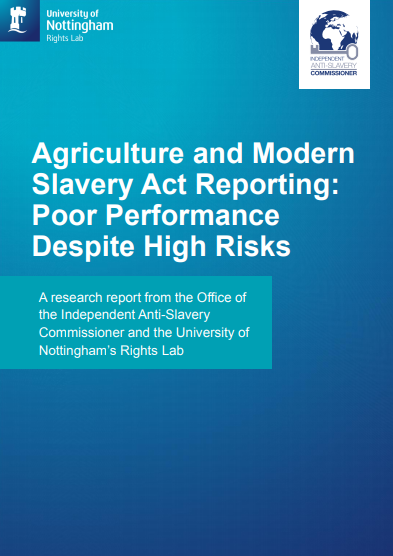Authors: Andrew Phillips, Dr Alexander Trautrims
Editor: Emily Kenway
Agriculture is a high-risk sector for potential modern slavery and human trafficking. The International Labour Organisation places agriculture, alongside forestry and fishing, as the sector with the 4th highest proportion of victims of forced labour worldwide. It is therefore important that UK businesses working within this sector take concerted action against modern slavery.
The report assesses agricultural companies’ compliance with the Modern Slavery Act. It finds:
- Businesses are not adhering to the law: only 50% of agricultural companies which should be reporting under the Act had done so one year after the requirements came into force
- Businesses are failing to meet the specific requirements of the law: Only 38% of these statements were compliant with the requirements of the law , meaning overall only 19% of the agricultural sector is abiding by the terms of the Modern Slavery Act
Whilst there is no prescribed content for modern slavery statements, government guidance recommends six areas for inclusion. When assessed against these, the report finds poor performance:
- Quality of statements is low: scoring an average of 12.9 out of 30, and there was little improvement from 2017 to 2018
- Companies are failing to assess risks: 40% of companies did not describe any form of risk appraisal nor identify areas of high risk
- Companies are failing to assess effectiveness: Nearly 80% of statements included nothing regarding the effectiveness of their steps taken to address slavery, despite government guidance advising this
The agricultural sector’s low compliance rate is found to be in line with that of other high risk sectors (food processing and packaging; mining; hotels), suggesting poor compliance rates under the Act may be the norm. This contrasts with much higher rates of compliance for the new Gender Pay Gap reporting rules (87% on day one in the first year of reporting), which has a comprehensive compliance framework in place managed by the Equalities and Human Rights Commission.
Key Facts
- Only 50% of agricultural companies which fall within scope of the Modern Slavery Act’s corporate reporting requirement had published a modern slavery statement one year after the requirements came into force
- Only 38% of these statements were compliant with the requirements of the law, meaning overall only 19% of the agricultural sector is abiding by the terms of the Modern Slavery Act
- The quality of content in agricultural companies’ modern slavery statements was low (scoring an average of 12.9 out of 30) and there was little improvement from 2017 to 2018
- Poor statements showed a tick-box approach, providing only generic comments about zero tolerance to modern slavery with no indication of actions taken to address the issue
- 40% of companies did not describe any form of risk appraisal nor did they identify areas of high risk
- Nearly 80% of statements included nothing regarding the effectiveness of their steps taken to address slavery, despite government guidance advising this
- 42% of statements gave little or no information about any training put in place
- The agricultural sector’s low compliance rate is found to be in line with that of other high risk sectors (food processing and packaging; mining; hotels), suggesting poor compliance rates are the norm
- This compares with much higher rates of compliance for the new Gender Pay Gap reporting rules (87% on day one in the first year of reporting)

